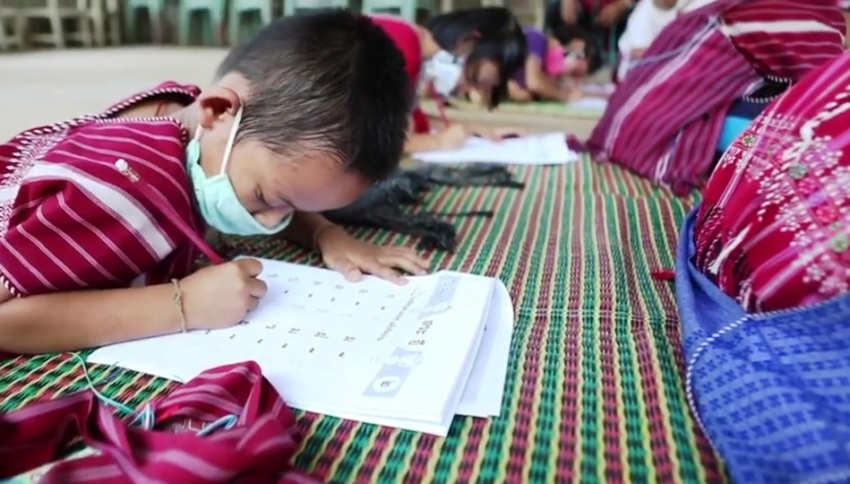Learning
Will Online Classes Deny Education to Thailand’s Impoverished Children

The education gap dividing the haves and the have nots threatens to become worse as schools go to online classes due to Covid-19. When the virus first hit Thailand, schools were quickly shut down.
But as the Covid-19 situation has been under control to an extent, the Education Ministry’s Office of Basic Education Commission (Obec) decided to let individual schools decide whether they should re-open. Or opting for online classrooms and anything in between.
“There are schools in urban, in rural and in remote areas. Since we believe one size won’t fit all, we have decided to let each school make its own decision. With students’ safety as the bottom line,” said Obec secretary-general Amnat Wichayanuwat.
According to a survey, many students living in remote areas of the country did not have access to the internet.
Conducted by Kasetsart University, a survey of 678 public and private school teachers in 67 provinces found 66 % of students do not have access to a computer or the internet. Furthermore about 36% of students don’t have a smartphone. The teachers concluded that only about 45% percent of students nationwide had the ability to attend online classes.
Readiness for online school classes
Krittiya Chinchanachokchai’s daughter is among the lucky students who are well-equipped for the “new normal” in learning. Her home has everything she needs for online classes. A smartphone, a smart TV, an iPad, a router and high-speed internet.
“My husband works in the IT field and I am a full-time housewife. This means I have time to make preparations for my daughter’s schooling.” Krittiya said when asked about her child’s readiness for online classes.
Her daughter, however, is hoping she can start attending classes as soon as possible at her new school.
“After passing the entrance exam, she was looking forward to going to school and making new friends. But the Covid-19 outbreak has forced her to stay at home,” the mother explained.
The school’s director, Asst Prof Chawalit Zoongyai, meanwhile, has plans to turn this crisis into an opportunity for innovation.
“We have worked with Microsoft (Thailand) to prepare online classes using the Microsoft Teams application,” he said. Adding that teachers and students would have to adapt to the new learning method. But parents would also have to adjust to their children studying at home.
“Summer semester online classes will kick off on May 18 and run until June 18,” he said. His large Bangkok secondary school has close to 1,600 students.
Schools to opt for online classes or distance-learning TV
To curb the spread of Covid-19, the Education Ministry postponed the start of the new semester from May 16 to July 1. The ministry also instructed both state and private schools to opt for online classes or distance-learning TV (DLTV). The experiment in distance learning for students in primary and junior secondary levels will run from May 18 to June 30.
However, a teacher from Kamphaeng Phet’s Muang district said online learning was out of question at her school.
“Even watching DLTV can be difficult for families who have just one television but many children,” she said, speaking on condition of anonymity.
Most of the students in her school come from sugarcane-farming families. Their parents work from dawn till dusk, leaving them little or no time supervise their children’s study at home.
“From my experience, it is difficult to get young children to focus on a screen. You can’t get kids from kindergarten to Pathom 3 level to even sit still,” she said, adding that students would only cover 30 percent of the curriculum if her school adopted DLTV learning.Her school has 153 students from kindergarten to Pathom 6 levels.
“It’s good that the Education Ministry has decided to be flexible. For my school, I think it will be better for students to physically attend class, and since there are just 20 students per classroom.
Social-distancing measures can be easily applied,” she said, adding that since hardly anybody leaves the community area, the risk of Covid-19 infections was low. Kampheng Phet province has not had a single Covid-19 case to date.
Normal school classes may be possible
Obec’s Amnat, meanwhile, said that schools wishing to open must first seek permission from their provincial governor.
“If the risk of Covid-19 is very low in their area, normal classes may be possible,” he said, adding that education officials would assess risks ahead of the new semester and come up with recommendations.
“For instance, if the virus still poses a risk, we may arrange for students to take turns in attending school. If there are 30 students per room, only 10 may be allowed to attend class each time, while those at home can work on assignments,” he said.
Athapol Anunthavorasakul, a lecturer at Chulalongkorn University’s Faculty of Education, supports the Education Ministry’s decision to be flexible.
“Teachers know best because they are closest to students,” he told Thai PBS.
However, he added, it is also important for the ministry to be clear about student evaluation criteria and curriculums.
“Will there be any adjustments? Each and every point should be clarified so teachers can design their classes accordingly. If it is necessary to hold online classes, then the teachers will have to talk to parents as well,” he said.






























